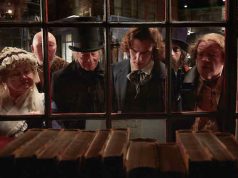The only confusing thing about “Adaptation” is trying to explain it. Watching it, it’s never unclear what’s going on. But look how bizarre things get as I try to give a plot summary:
In 1998, Susan Orlean wrote “The Orchid Thief,” about a Florida man who was arrested for taking the exotic flowers out of a preserve. Then, Hollywood screenwriter Charlie Kaufman (“Being John Malkovich”) was hired to adapt the book into a film. The book, however, is 1) non-fiction and 2) about flowers, so a screen adaptation was an uphill battle.
And so Kaufman gave up on the normal adaptation process and wrote “Adaptation,” which is the story of Kaufman trying to adapt “The Orchid Thief.” It is a movie about someone trying to write a movie — and the movie we’re watching is the movie he’s trying to write.
However, it’s also a rather legitimate adaptation of “The Orchid Thief,” with Susan Orlean interviewing the man who was arrested, and developing a friendship with him, all of which makes it into the book. The book was as much about Orlean’s process of reporting on the man as it was about the man himself — which means “Adaptation” is a movie about someone writing a movie that is based on a book about someone writing a book. And it’s also about flowers.
See what I mean?
The genius of this remarkably clever and funny film is how non-confusing it is to watch. The director is Spike Jonze, who directed Kaufman’s “Being John Malkovich” and produced his “Human Nature”; he knows how Kaufman’s mind works, and more importantly, he knows how to transfer that mind to the screen.
Kaufman, played in the movie by Nicolas Cage, is a thoroughly neurotic, balding man with a bad case of writer’s block. His twin brother, Donald — who does not exist in real life but is surely the onscreen manifestation of Kaufman’s id — is carefree, getting a lot more women than Charlie does despite having the same shlumpy physical appearance and bad hair.
Charlie is paralyzingly stressed and sweaty at the prospect of adapting “The Orchid Thief”; Donald, meanwhile, is excited about his own screenwriting project, a by-the-numbers serial-killer story with a twist ending that sounds like it will be truly awful when it hits the screen, which of course means it is destined to make $100 million.
Intercut with all of this are flashbacks to a few years earlier, when Orlean (played by Meryl Streep) was writing “The Orchid Thief.” She is amazed by her subject, John Laroche (Chris Cooper), a toothless redneck who, for all his obvious defects, knows his horticulture and is passionate enough about it to wade through dangerous swamps just to steal a flower.
That passion is what fascinates Orlean, an ordinary middle-aged writer whose own life is rather dull. “I want to know what it feels like to care about something passionately,” she says in her book.
In a sense, “Adaptation” is about the writing process, which makes it a sure hit among creative types. One of the funniest sequences has Charlie attending a screenwriting seminar by Robert McKee, who really does give seminars in real life, but who is fictionally, vulgarly portrayed here by Brian Cox. McKee is spouting all these “principles” on screenwriting that, in Charlie’s mind, will do nothing but make his screenplay generic and Hollywood-ized. That “Adaptation” eventually succumbs to those very tactics, bringing in car chases, guns and last-minute epiphanies, is either its greatest joke or its greatest downfall. (Is it OK to use cliches as long as you acknowledge you’re using them?)
But in another way, the film is about human adaptation, learning how to thrive in a world that is often unkind and unhelpful. Charlie sees this in Donald; Susan sees it in John Laroche; these are both characters whom Charlie and Susan would otherwise view as inferior in many ways. Yet they’ve clearly learned how to adapt, which Charlie and Susan have not.
Nicolas Cage is fantastic as the Kaufman brothers; amazingly, his best scenes are with himself, the twins’ rapport bouncing around like the best of the dumb guy/smart guy comedy teams of yesteryear. Meryl Streep is fine, as always, shining in Susan’s few showcase scenes (especially one where she’s a bit high and talking on the phone).
I see the film’s final 30 minutes as a derailing, albeit an intentional one. It’s bold to perpetrate a joke your audience may not get, and I admire the risk involved, though I don’t necessarily enjoy it. I get the joke; I just don’t know how funny I think it is.
But that may be beside the point. The very fact that “Adaptation” can show how a writer begins as an innovator and eventually become commonplace makes it an innovative film itself: Most movies simply start out ordinary and stay that way; this one has the guts to intentionally knock itself off the tracks. Laugh-out-loud funny and endlessly imaginative, it’s a treat for viewers who are tired of the same old thing.
A- (1 hr., 52 min.; )




